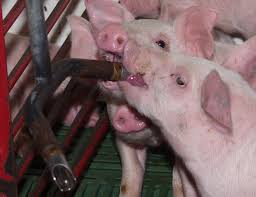

Pick out a good feed for your Pigs.
People evaluate the diets to make sure they meet the amino acid requirements of the Pig. Lysine is the amino acid that needs to be supplemented first because it is limiting the growth of the Pig.
Pigs should feed about 18% of crude protein.
Pigs should consume 6 to 10 kg of feed per day to be able to grow healthy. Moreover, farmers also feed those eggs for protein content.
By adding ascorbic acid or Vitamin C to the diet of Pigs (about 800 Gms for every kilo of feeds) will make them grow faster.
For a successful Pig farming business, the Pigs must be given the correct type of feed as well as the correct amount of feed. Then, this will ensure its reproductive efficiency, growth efficiency, feed utilization, and better meat quality, thus maximizing the profits of the Pig business. If one fails to give good feed to Pigs then there will be a substantial loss of the slaughter weight targets and the desired meat quality of the pork. This can lead to a loss in the Pig business. It must be noted that Pigs need different types and amounts of feed depending on which stage of growth they are at.
Feed like green forage, seasonal fodder, and kitchen waste, and dry concentrate feed, etc. can be fed to Pigs. To achieve a high growth rate, Pigs should be completely reared on concentrate feed including the pellet one. As kitchen waste, garbage, or green fodder doesn’t provide sufficient nutrition as well as the due unhygienic condition of the waste, the chance of disease occurrence increases that reduces the meet quality and consumption. The main ingredients of Pig feed are oat, grains, maize, wheat, rice, sorghum, and other millets. Supplements such as oil cakes, fishmeal, meat meal, mineral supplement, and vitamins can also be added to the feed for better results.
Feeding Process in Pig Farming – There is plenty of Pig feeds in the market, and each feed is used for several purposes like fattening among many others. You should never feed Pigs with table scraps and garbage. Carefully provide Pigs with green vegetables to help them stay healthy. Avoid giving the meat since they are likely to add a lot of weight which can decrease profits.
Water is important for Pig farming. A large clean water supply will be required to maintain the Pig’s necessities, for example, a growing young Pig can drink approximately 10 liters of freshwater per day while an adult Pig can drink 25 to 50 liters per day.
 Contact Jaguza Support
Contact Jaguza Support